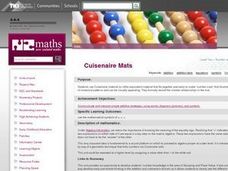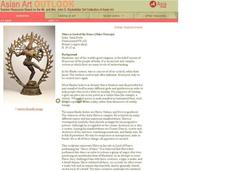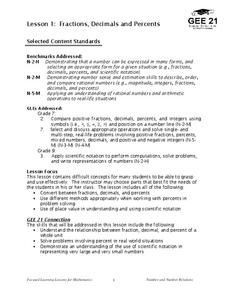Arts & Humanities
Make Your Own Flower Garden
Get into art with a little instructional activity on flower parts. The class reviews basic information regarding flowers and then they use a paper mosaic technique to create visual representations of the lovely plants.
Curated OER
Cuisenaire Mats
First graders use Cuisenaire rods to study the mathematical symbols =, <, > for the relationships is equal to, is less than, and is greater than. They use the rods to show visual explanations of common number combinations.
National Council of Teachers of Mathematics
The Roll Out Fractions Game: Comparing Fractions
Reinforce the concept of comparing fractions with a hands-on, two-player game that calls for a visual model, score board, and dice. Players roll dice to acquire their given fraction, create the fraction using fraction tiles, then...
Curated OER
Comparing Fractions with Like Numerators or Denominators
Two visual problems give mathematicians a chance to compare fractions with like denominators. They examine two pairs of shapes with portions filled in, adding the greater than, less than, or equal to symbol between each. The shape pairs...
Curated OER
Exploring With the Anza 1775-1776
Eighth graders conduct research on the Anza Colonizing expedition utilizing the Web de Anza website. They read diary entries, answer questions, and create a poster highlighting an event that symbolizes the Expedition.
Curated OER
Using Manipulatives to Teach Fractions
There is no doubt that learners remember what they have learned when they have a visual representation. Using an egg carton and candy bars, they explore the concept of fractional amounts. By having students cut the egg carton into parts...
Math Worksheets Land
Compare Two-Digit Numbers - Guided Lesson
Practice comparing number values in a variety of activities on this learning exercise. Youngsters complete a statement comparing 20 to 20, choosing from three options: is greater than, is less than, and is equal to. Then, they put four...
Curated OER
The Counting Caterpillar
A daily counting routine builds a caterpillar with 100 body segments (marked with symbols to indicate 2s, 5s, and 10s) by the 100th day of school. Provides structured repetition as part of the morning routine so that by 100th day,...
Curated OER
The Map Cartouche
Students discuss the history and purpose of cartouches. They examine examples of cartouches and design an original example with symbols of their choosing.
Curated OER
Nataraj Shiva as Lord of the Dance
Pupils considers the piece of artwork entitled, The Nataraj, Lord Shiva and Lord of the Dance to visualize several of the most important ideas of Hinduism.
Curated OER
What Does It Mean To Be a Good Citizen?
Students study citizenship and what it means to be a good sitizen. They create their own country and determine its citizenship rules. They work together to create a visual representation of what makes a good citizen.
Curated OER
Colonial Silver and Tea
Learners examine silver pieces from colonial Boston in order to determine the social context of these objects. They compare signs of social status in colonial Boston with those of today by looking at the associated visuals.
Curated OER
The Envelope Guessing Game
Students work with a partner by using the symbol bracelets from lesson #1. They that has the number #1 look at the object keeping it hidden from student #2. Student number 2 then ask questions in order to determine the qualities and...
Curated OER
Comparing and Ordering Decimals - Complete Lesson Plan
Base ten blocks serve as visual representations of numbers that include decimals to the hundredths place. Children compare and order decimals in their math journal as they build the corresponding numbers with base ten blocks.
Louisiana Department of Education
Fractions, Decimals, and Percents
Fractions, decimals, and percents all say the same thing! Show your classes how to convert between the three forms using visual and numeric representations. Then lead them to an understanding of scientific notation.
Curated OER
Comparing 3 Digit Numbers
Looking for some visual practice with number comparisons? You've found it! There are three problems here challenging scholars to utilize the greater than, less than, and equal to signs. Each question is formatted differently to...
Curated OER
Assembling A Story
Learners observe, discuss, and interpret Radcliffe Bailey's work "By the River" by creating a personal narrative of the 18th or 19th century. Internet access is required and related links are offered for teaching aides.
Curated OER
Psychedelic 60's
Students examine the Pop Art of the 1960s. Using the internet, they become experts on the subject through research. They compare and contrast the literary work to the art work during this same period and examine how the culture of the...
Curated OER
Symmetrical Mummy Drawings/Mixed Media
Second graders explore Egyptian culture, including mummification, and hieroglyphic writings. They create their own mummy case using paper and a variety of materials. Students use symmetry to create their mummy.
Curated OER
Dynamics
Third graders recognize and identify the three types of balance. They analyze and identify the type of balance used in various works of art. Students create a symmetrically balanced work of art. They use a ruler, shape templates, an...
Curated OER
Symbols to Sculptures
Students transform 2-dimensional drawings to synthesized, free standing 3-dimensional forms.
Curated OER
Pictures and Slogans Persuade an Audience
Students discover relationships between advertisement and persuasive techniques. For this literacy and consumer education lesson, students select magazine or newspaper advertisements that use symbols, pictures, and slogans to...
Curated OER
Pictures and Slogans Persuade an Audience!
Students understand that writers utilize various techniques to persuade an audience. They develop an awareness of how the media works to persuade them as the consumer. They create a visual representation of various feelings and emotions...
Curated OER
Grading on a Curve?
Students create a report card for George Bush based on research of key issues. They review political symbols and send a letter to the President explaining why they have given him the grades.























